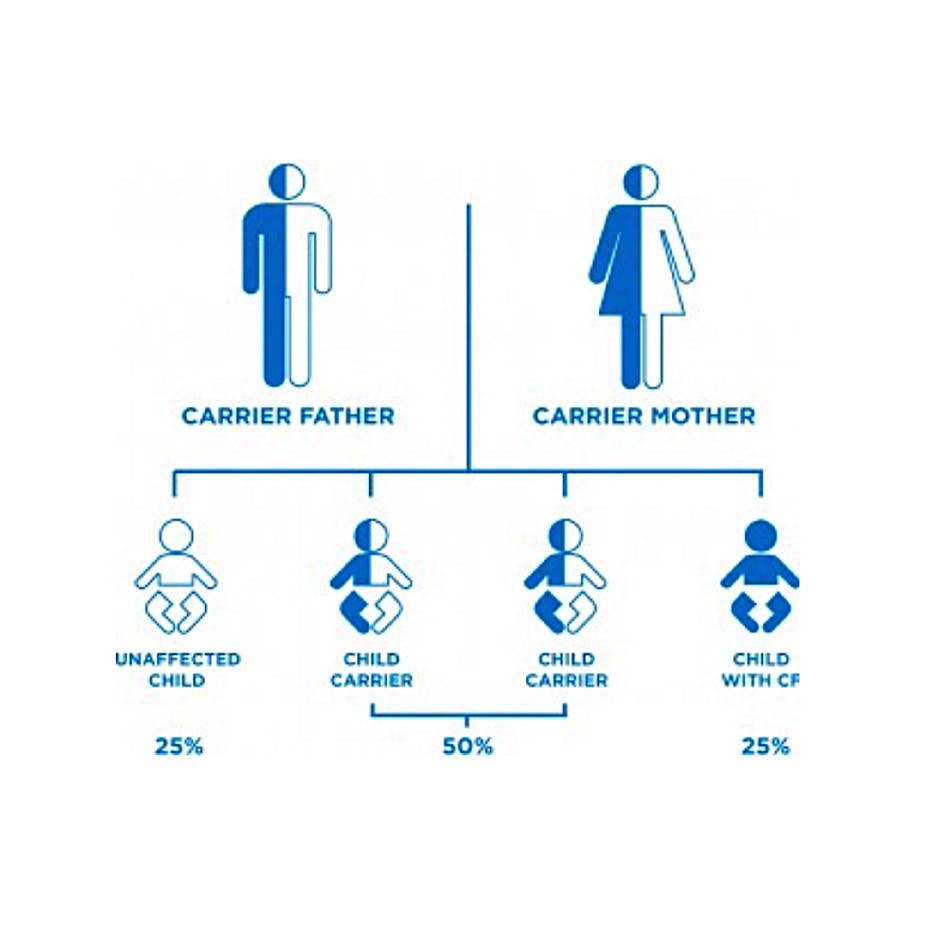All about cystic fibrosis
Read here about the causes, symptoms, diagnosis and genetics of cystic fibrosis.


Causes
Cystic fibrosis (CF) is the most common, fatal, genetic disease affecting children and young adults in Canada. A child born with CF will have inherited one copy of the CF gene from each parent. CF is caused by mutations in the gene that produces the cystic fibrosis transmembrane conductance regulator protein (CFTR).
Approximately, one in 25 Canadians carry an abnormal version of the gene responsible for cystic fibrosis. Carriers do not have cystic fibrosis or exhibit any of the symptoms of the disease.
When two parents who are carriers have a child, there is a 25 per cent chance that the child will be born with cystic fibrosis; there is also a 50 per cent chance that the child will be a carrier and a 25 per cent chance that the child will neither be a carrier nor have cystic fibrosis.
It is vital to remember that a person with CF and their parents do not cause cystic fibrosis. A child’s environment or external factors cannot cause the disease as it is genetic and present from birth.
Symptoms
Cystic fibrosis has a multifaceted impact on the body, primarily targeting the digestive system and lungs. While the severity of CF varies from person to person, there are various effects on the body, the most devastating are in the lungs, where a build-up of thick mucus causes severe respiratory problems, including persistent lung infections and gradual lung deterioration. Mucus also builds up in the digestive tract. This, in combination with damage to the pancreas, makes it difficult to digest and absorb nutrients from food.
Typical complications may include but aren’t limited to:
- Wheezing, shortness of breath and chest pain
- Progressive lung damage from chronic lung infections and abnormal inflammation
- Intestinal obstruction, especially in newborns
- Frequent sinus infections
- Frequent abdominal pain
- Difficulty digesting fats and proteins
- Malnutrition and vitamin deficiencies because of the inability to absorb nutrients
- Poorer growth and body weight than peers, despite having a good appetite
- CF-related diabetes
- Infertility in males and sub-fertility in females
- Anxiety and depression
CF diagnosis and genetics
Typically, a diagnosis of cystic fibrosis begins with a newborn screening, where a tiny blood sample is taken. If the initial test indicates a potential issue, further diagnostic tests are conducted. While the majority of new CF diagnoses are detected very early in life via newborn screening (available in most provinces and territories), there is a small percentage of children, adolescents and adults who are identified at various ages and stages, also known as a “late diagnosis”.
One diagnostic test that is used in Canada is the sweat test, which measures the salt concentration in a person's sweat. People with cystic fibrosis have higher salt levels, and this test helps confirm the diagnosis. Additionally, genetic and prenatal testing can identify specific CFTR gene mutations. If you have a family history of CF, consider getting tested to see if you and your partner are carriers.
Cystic Fibrosis Canada and other organizations continue to invest heavily in research to develop new treatments and therapies that target the underlying cause of the disease.
Research advancements funded by Cystic Fibrosis Canada4400
Canadians are living with CF
98
new CF diagnoses in Canada in 2022
65%
of all Canadians living with cystic fibrosis are adults
37
or younger was the age of half the Canadians with CF who passed away in the past five years
CF resources
Here are some resources to help expand your knowledge about cystic fibrosis.
1 / 4
You can change the CF story
Explore the many ways you can support the cystic fibrosis community in Canada.
Get Involved Today